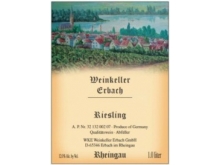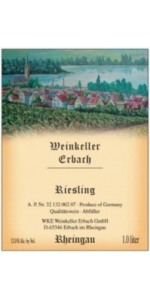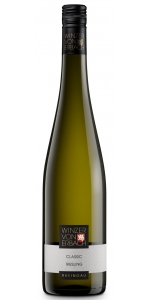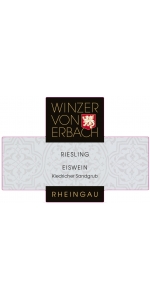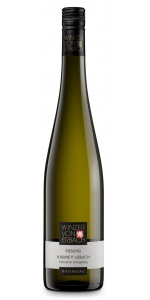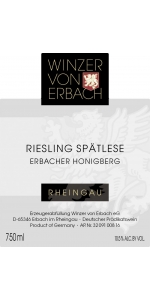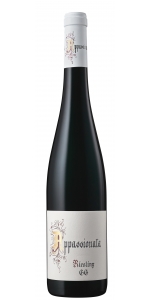Weinkeller Erbach Riesling 2018 (liter)
| Country: | Germany |
| Region: | Mosel |
| Winery: | Winzer Von Erbach |
| Grape Type: | Riesling |
| Vintage: | 2018 |
| Bottle Size: | 1000 ml |
Weinkeller Erbach Riesling (liter) is 100 percent Riesling.
Round and refreshing wine with light touches of lemon and lime on the nose. Slightly sweet mouthfeel, with juicy and fruity flavors.
Winzer von Erbach Riesling Eiswein is made from 100 percent Riesling.
The Eiswein has aromas of concentrated yellow fruit and a fruity sweetness. It's a high end product with a very long aging potential.
The grapes were picked frozen which resulted in a concentration of sugar, acidity and aromas and a low yield.
Pairs with blue cheese, fois gras, French apple cake.
Winzer Von Erbach Riesling Rheingau Erbacher Honigberg Kabinett is 100% Riesling.
This Riesling Kabinett shows hints of apple, citrus and peach and is mineral - scented.
The purity of fruit aroma combined with a unique and delicate fruit acidity makes this Riesling to a typical ambassador of one of the greatest grape varieties in the world.
Pairs well with gorgonzola, blue cheeses and pastas in a creamy sauce.
Honeyed style, rich minerality and luscious creaminess. Flavors of baked pineapple and pear. Fresh and juicy on the finish.
From the famous Erbacher Honigberg vineyard. Average of the vines is 20 years old.
Cool fermentation, matured on the lees for 2 months before bottling, with a slight filtration.
Riesling Rheingau Erbacher Honigberg Spatlese goes well with Indian Curry and blue Cheese
Inspired by the historical winemaking techniques of Erni Loosen’s great-grandfather, the Appassionata Riesling GG is made in the same way as the Dr. Loosen Grosses Gewächs (“Great Growth”) Rieslings he produces in Germany. The GG designation indicates a dry-style wine from a vineyard of special distinction — in this case, the old-vine Medici vineyard, planted in 1976. We farm this exceptional site, which is just a few miles east on the Chehalem Mountain ridge.
The fruit for this wine was harvested from old Rieslng vines (planted in 1976) in the Medici Vineyard, which is also in the Chehalem Mountains AVA, just a few miles from the winery. We lease this vineyard and have been farming it organically since 2015. The wine was fermented in a 3,000-liter German oak cask, and rests on the full lees for 12 months before bottling. The extended lees contact allows the wine to clarify and find its own harmonious balance naturally.
Production notes:
Whole-cluster pressing; natural fermentation in a neutral 3,000-liter oak cask; matured on the full lees for 12 months; no bâtonnage.
SALE!
Weinkeller Erbach Riesling (liter) is 100 percent Riesling.
Round and refreshing wine with light touches of lemon and lime on the nose. Slightly sweet mouthfeel, with juicy and fruity flavors.
The Winzer Von Erbach Estate
The wine-growers association was founded in 1897. Today 45 vintners deliver grapes from the Erbach and Kiedrich vineyards to the cellar. There is close a relationship with the vintners, who are all part owners of their winery, all of whom have access to highly skilled and experienced viticultural advice. The cellar was built in 1903 in the "Art Nouveau" style. Today they are the most highly rated Wine cooperation in the Rheingau region, well known for producing high quality Riesling wines with a strong price-value relationship.
The Winzer Von Erbach Vineyard
Together with the Mosel region, Rheingau is famous for growing top quality grapes of the best German white wine varietal, the Riesling. With 3,200 hectares (7,904 acres) in a 45 kilometer stretch from Wiesbaden to Lorchhausen, it is one of the smaller wine regions in Germany.
More than 30% of their vineyards are located in the top spots of the Rheingau called "erstes Gewächs" (first growth). 50 hectares are cultivated in the following locations in Erbach and Kiedrich: Erbacher Michelmark: (12 hectares), Erbacher Steinmorgen: (8 hectares), Erbacher Honigberg: (20 hectares), Kiedricher Sandgrub: (10 hectares).
Honeyed style, rich minerality and luscious creaminess. Flavors of baked pineapple and pear. Fresh and juicy on the finish.
From the famous Erbacher Honigberg vineyard. Average of the vines is 20 years old.
Cool fermentation, matured on the lees for 2 months before bottling, with a slight filtration.
Riesling Rheingau Erbacher Honigberg Spatlese goes well with Indian Curry and blue Cheese
- back
Peju Winery Legacy Collection Cabernet Sauvignon is made from 88% Cabernet Sauvignon, 6% Petit Verdot, 6% Merlot.
This stunning wine boasts an expressive nose that immediately captivates the senses. On the palate, the wine opens up with complex layers of dried red fruit and hints of cigar box. A subtle hint of wet stone adds a unique touch to the overall experience. The wine's medium to full body creates a beautiful balance between the fruit and tannin structure. The finish is simply divine, with a touch of cocoa dust that lingers on the palate long after the last sip.
Review:
The 2022 Peju Legacy Collection Cabernet Sauvignon is a blend of 88% Cabernet Sauvignon, 6% Petit Verdot, 5% Merlot, and 1% Cabernet Franc, aged for 19 months in 40% new French and American oak, crafted by winemaker Sara Fowler. Fragrant notes of spiced plums, leather, fine cedar, and violets lift from the glass. Full-bodied, it features a framework of elongated, supple tannins, creamy black cherry fruits, dark plum jam, mocha, and a cool wet slate character on the lengthy finish.
-Decanter 94 Points
Intense, fresh and fruity bouquet, reminiscent of a tangy red fruit tart (wild strawberry, blueberry), slightly sweet yet underpinned by more concentrated, jammy and citrus notes. The aromatic complexity comes through after a few swirls in the glass giving us a medley of spice, warm cinnamon and peppers. Fleshy attack dominated by ripe, crunchy, plump red fruit that brings depth and creaminess. The fruity structure is gradually elongated by a chalky, mineral freshness that creates a lingering sensation of lightness and harmony on the finish.
Review:
Roederer's 2014 Brut Vintage is beautiful, offering up aromas of pear, mirabelle plum, red berries, warm biscuits and smoke. Full-bodied, layered and elegantly muscular, it's seamless and complete, with terrific mid-palate depth and amplitude. Framed by bright acids and enlivened by a pinpoint mousse, it concludes with a penetrating finish. The blend is 70% Pinot Noir, emphasizing Verzy, and pressure is a touch higher than in its more ethereal Blanc de Blancs counterpart. As I wrote of its 2013 predecessor, this is a wine that puts many prestige cuvées to shame.
95 Points Robert Parker's Wine Advocate

